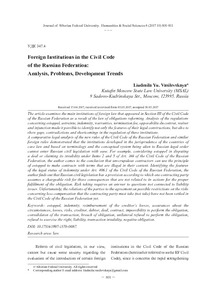Foreign Institutions in the Civil Code of the Russian Federation: Analysis, Problems, Development Trends
Скачать файл:
URI (для ссылок/цитирований):
https://elib.sfu-kras.ru/handle/2311/33304Автор:
Vasilevskaya, Liudmila Yu.
Василевская, Л.Ю.
Дата:
2017-06Журнал:
Журнал Сибирского федерального университета. Гуманитарные науки. Journal of Siberian Federal University. Humanities & Social Sciences;2017 10 (6)Аннотация:
The article examines the main institutions of foreign law that appeared in Section III of the Civil Code of the Russian Federation as a result of the law of obligations reforming. Analysis of the regulations concerning estoppel, astreinte, indemnity, warranties, termination fee, opposabilite du contrat, waiver and injunction made it possible to identify not only the features of their legal constructions, but also to show gaps, contradictions and shortcomings in the regulation of these institutions.
A comparative legal analysis of the new rules of the Civil Code of the Russian Federation and similar foreign rules demonstrated that the institutions developed in the jurisprudence of the countries of case law and based on terminology and the conceptual system being alien to Russian legal order cannot enter Russian civil legislation with ease. For example, considering estoppel in disputing a deal or claiming its invalidity under Items 2 and 5 of Art. 166 of the Civil Code of the Russian Federation, the author comes to the conclusion that unscrupulous contractors can use the principle of estoppel to make contracts with terms that are illegal in their content. Identifying the features of the legal status of indemnity under Art. 406.1 of the Civil Code of the Russian Federation, the author finds out that Russian civil legislation has a provision according to which one contracting party assumes a chargeable risk for those consequences that are not related to its actions for the proper fulfillment of the obligation. Risk taking requires an answer to questions not connected to liability issues. Unfortunately, the relations of the parties to the agreement on possible restrictions on the risks concerning loss compensation that the contracting party must take (not take) have not been settled in the Civil Code of the Russian Federation yet В статье рассматриваются основные институты иностранного права, появившиеся в раз-
деле III ГК РФ в результате реформы обязательственного права. Анализ норм об estoppel,
astreinte, indemnity, warranties, termination fee, opposabilite du contrat, waiver, injunction дал воз-
можность не только выделить особенности их правовых конструкций, но и показать пробе-
лы, противоречия и недостатки в нормативной регламентации указанных институтов.
Сравнительно-правовой анализ новых норм ГК РФ и аналогичных иностранных правил пока-
зал, что институты, развитые в судебной практике государств прецедентного права и опи-
рающиеся на терминологию и чуждый нашему правопорядку понятийный аппарат, не могут
без издержек быть рецепированы российским гражданским законодательством. Например,
рассматривая estoppel при оспаривании сделки или заявлении о ее недействительности по п. 2
и 5 ст. 166 ГК РФ, автор приходит к выводу, что недобросовестные контрагенты могут ис-
пользовать принцип estoppel для заключения договоров с незаконными по своему содержанию
условиями. Выявляя особенности правовой конструкции indemnity по ст. 406.1 ГК РФ, автор
делает вывод, что в нашем гражданском законодательстве появился институт, согласно
которому одна сторона договора принимает на себя возмездное несение риска за те послед-
ствия, которые не связаны с ее действиями по надлежащему исполнению обязательства. Не-
сение риска требует ответа на вопросы, не связанные проблемами ответственности. К со-
жалению, отношения сторон договора по возможным ограничениям в части рисков, которые
обязана принять (не принять) та или иная сторона договора, в котором есть оговорка о воз-
мещении потерь, в ГК РФ не урегулированы
Коллекции:
Метаданные:
Показать полную информациюСвязанные материалы
Показаны похожие ресурсы по названию, автору или тематике.
-
Constitutional Obligation of a State to Compensate for Damage Sustained by Victims of Crimes
Panchenko, Vladislav Yu.; Mikhaleva, Anastasia E.; Панченко, В.Ю.; Михалева, А.Е. (Сибирский федеральный университет. Siberian Federal University, 2018-06)The paper deals with Article 52 of the Russian Constitution, which obliges the state to provide a compensation for damage sustained by victims of crimes. On the one hand, many lawyers believe that nowadays positive obligations ... -
Implementing ECtHR Judgments in So-Called “Multipolar Fundamental Rights Situations”
Breuer, Marten; Брейер, М. (Сибирский федеральный университет. Siberian Federal University, 2017-06)The implementation of ECtHR judgments may be particularly difficult in cases where the concerns of two or more private litigants must be weighed against each other. The Strasbourg proceedings are unilateral in that only ... -
Legal Issues of Smart Contracts in Contract Law
Zainutdinova, Elizaveta V.; Зайнутдинова, Е. В. (Сибирский федеральный университет. Siberian Federal University, 2021-11)The research is carried out on some legal issues of smart contracts and their place in Russian and other countries’ contract law. By means of contract law such issues are analysed: 1) conclusion and performance of smart ... -
Meaning and Effects of the European Convention on Human Rights and of the Judgments of the European Court of Human Rights in Germany
Schmahl, Stefanie; Шмаль, С. (Сибирский федеральный университет. Siberian Federal University, 2017-06)The European Convention on Human Rights, its protocols and the case-law of the European Court of Human Rights are shaping the German legal order to a considerable extent, although the Convention formally takes only the ... -
Mandatory Administrative Acts Issued as a Result of the Investigation of Industrial Accidents in Russia
Terekhova, Anna V.; Терехова, А. В. (Journal of Siberian Federal University. Сибирский федеральный университет, 2024-06)The administrative act is one of the central themes in the theory of administrative law. The existence of legal force means the ability of the act to regulate managerial relations and solve management problems in the ...

